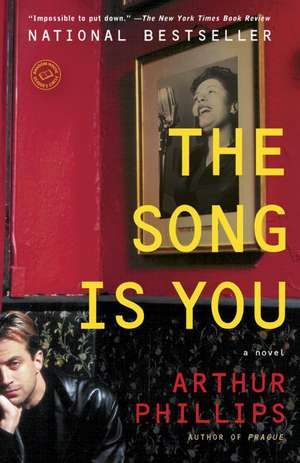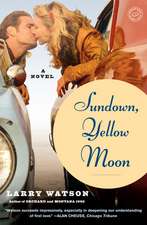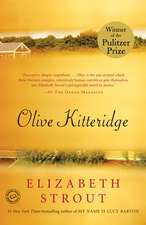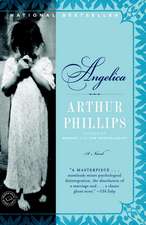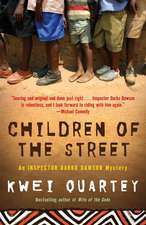The Song Is You: Random House Reader's Circle
Autor Arthur Phillipsen Limba Engleză Paperback – 28 feb 2010
Until one snowy night in Brooklyn, when his life’s soundtrack—and life itself—start to play again. Julian stumbles into a bar and sees Cait O’Dwyer, a flame-haired Irish rock singer, performing with her band, and a strange and unlikely love affair is ignited. Over the next few months, Julian and Cait’s passion plays out, though they never meet. What follows is a heartbreaking dark comedy, the tenderest of love stories, and a perfectly observed tale of the way we live now.
Din seria Random House Reader's Circle
-
 Preț: 107.68 lei
Preț: 107.68 lei -
 Preț: 100.16 lei
Preț: 100.16 lei -
 Preț: 111.14 lei
Preț: 111.14 lei -
 Preț: 111.29 lei
Preț: 111.29 lei -
 Preț: 108.72 lei
Preț: 108.72 lei -
 Preț: 117.39 lei
Preț: 117.39 lei -
 Preț: 139.68 lei
Preț: 139.68 lei -
 Preț: 131.94 lei
Preț: 131.94 lei -
 Preț: 57.77 lei
Preț: 57.77 lei -
 Preț: 100.83 lei
Preț: 100.83 lei -
 Preț: 95.48 lei
Preț: 95.48 lei -
 Preț: 98.78 lei
Preț: 98.78 lei -
 Preț: 103.03 lei
Preț: 103.03 lei -
 Preț: 128.86 lei
Preț: 128.86 lei -
 Preț: 81.80 lei
Preț: 81.80 lei -
 Preț: 128.64 lei
Preț: 128.64 lei -
 Preț: 74.62 lei
Preț: 74.62 lei -
 Preț: 120.71 lei
Preț: 120.71 lei -
 Preț: 106.04 lei
Preț: 106.04 lei -
 Preț: 65.10 lei
Preț: 65.10 lei -
 Preț: 125.84 lei
Preț: 125.84 lei -
 Preț: 119.55 lei
Preț: 119.55 lei -
 Preț: 106.42 lei
Preț: 106.42 lei -
 Preț: 128.33 lei
Preț: 128.33 lei -
 Preț: 128.02 lei
Preț: 128.02 lei -
 Preț: 115.49 lei
Preț: 115.49 lei -
 Preț: 122.14 lei
Preț: 122.14 lei -
 Preț: 105.22 lei
Preț: 105.22 lei -
 Preț: 94.23 lei
Preț: 94.23 lei -
 Preț: 102.86 lei
Preț: 102.86 lei -
 Preț: 108.90 lei
Preț: 108.90 lei -
 Preț: 115.34 lei
Preț: 115.34 lei -
 Preț: 116.76 lei
Preț: 116.76 lei -
 Preț: 124.72 lei
Preț: 124.72 lei -
 Preț: 159.17 lei
Preț: 159.17 lei -
 Preț: 91.55 lei
Preț: 91.55 lei -
 Preț: 104.59 lei
Preț: 104.59 lei -
 Preț: 105.41 lei
Preț: 105.41 lei -
 Preț: 104.66 lei
Preț: 104.66 lei -
 Preț: 117.80 lei
Preț: 117.80 lei -
 Preț: 90.64 lei
Preț: 90.64 lei -
 Preț: 104.81 lei
Preț: 104.81 lei -
 Preț: 108.50 lei
Preț: 108.50 lei -
 Preț: 120.26 lei
Preț: 120.26 lei -
 Preț: 98.21 lei
Preț: 98.21 lei -
 Preț: 111.76 lei
Preț: 111.76 lei -
 Preț: 135.15 lei
Preț: 135.15 lei -
 Preț: 122.45 lei
Preț: 122.45 lei -
 Preț: 139.15 lei
Preț: 139.15 lei
Preț: 103.44 lei
Nou
Puncte Express: 155
Preț estimativ în valută:
19.80€ • 21.50$ • 16.63£
19.80€ • 21.50$ • 16.63£
Carte disponibilă
Livrare economică 01-15 aprilie
Preluare comenzi: 021 569.72.76
Specificații
ISBN-13: 9780812977912
ISBN-10: 0812977912
Pagini: 269
Dimensiuni: 134 x 207 x 15 mm
Greutate: 0.27 kg
Editura: Random House Trade
Seria Random House Reader's Circle
ISBN-10: 0812977912
Pagini: 269
Dimensiuni: 134 x 207 x 15 mm
Greutate: 0.27 kg
Editura: Random House Trade
Seria Random House Reader's Circle
Notă biografică
Arthur Phillips is the internationally bestselling author of Angelica, The Egyptologist, and Prague, which was a New York Times Notable Book and winner of the Los Angeles Times Art Seidenbaum Award for First Fiction. He lives in New York with his wife and two sons.
From the Hardcover edition.
From the Hardcover edition.
Extras
Chapter One
Julian Donahue's generation were the pioneers of portable headphone music, and he began carrying with him everywhere the soundtrack to his days when he was fifteen. When he was twenty-three and new to the city, he roamed the Brooklyn Heights Promenade, claimed it as his discovery, colonized it with his hours and his Walkman. He fell in love with Manhattan's skyline, like a first-time brothel guest falling for a seasoned professional. He mused over her reflections in the black East River at dusk, dawn, or darkest night, and each haloed light-in a tower or strung along the jeweled and sprawling spider legs of the Brooklyn Bridge's spans-hinted at some meaning, which could be understood only when made audible by music and encoded in lyrics. Play on, Walkman, on, rewind and give me excess of it.
Late in the evening of the day he completed his first job directing a television commercial, Julian sat in the fall air and listened to Dean Villerman on his Walkman, stared at Manhattan, and inhaled as if he'd just surfaced from a deep dive, and he had the sensation that he might never be so happy again as long as he lived. This quake of joy, inspiring and crippling, was longing, but longing for what? True love? A wife? Wealth? Music was not so specific as that. "Love" was in most of these potent songs, of course, but they-the music, the light, the season-implied more than this, because, treacherously, Julian was swelling only with longing for longing. He felt his nerves open and turn to the world like sunflowers on the beat, but this desire could not achieve release; his body strained forward, but independent of any goal, though he did not know it for many years to come, until he proved it.
Because years later, when he had captured all that-love, wife, home, success, child-still he longed, just the same, when he listened to those same songs, now on a portable CD player, easily repeated without the moodicidal interruption of rewinding (turning spindles wheezing as batteries failed). He felt it all again. He pressed Play and longed still.
When he was first married, Julian worried how he would feel about particular songs if his marriage should expire prematurely, in Rachel's death or her infidelity (yes, he had imagined it before he knew it, perhaps imagined it so vividly that he caused it). And he prepared himself to lose music for Rachel, as the price of love, the ticket torn at admission: he assumed that, whether the marriage worked or not, he would never really find his way back to the music, that old songs would be sucked dry of promise or too clogged with memory.
But no, music lasted longer than anything it inspired. After LPs, cassettes, and CDs, when matrimony was about to decay into its component elements-alimony and acrimony-the songs startled him and regained all their previous, pre-Rachel meanings, as if they had not only conjured her but then dismissed her, as if she had been entirely their illusion. He listened to the old songs again, years later on that same dark promenade, when every CD he had ever owned sat nestled in that greatest of all human inventions, the iPod, dialed up and yielding to his fingertip's tap. The songs now offered him, in exchange for all he had lost, the sensation that there was something still to long for, still, something still approaching, and all that had gone before was merely prologue to an unimaginably profound love yet to seize him. If there was any difference now, it was only that his hunger for music had become more urgent, less a daily pleasure than a daily craving.
Julian Donahue married in optimistic confusion, separated in pessimistic confusion, and now was wandering toward a mistrustful divorcistan, a coolly celibate land. He understood little of what had transpired between the day he said he could not live without this woman and the day when the last of her belongings (and many of his) left their home. If he forced himself to recall, he would revisit particular arguments, understand they were scaffolded by interlocking causes and built upon the unstable ruins of previous arguments. He saw that old arguments had been only partially dismantled either to mutual satisfaction or to no one's, or to her satisfaction (perhaps feigned) and his relief, or to his satisfaction and her mounting resentment, to which he had been blind. Perhaps all of this swayed upon some swampland of preexisting incompatibility, despite mutual feelings of affection and lust all signatories probably felt back at the start. Obviously he would not downplay the role of Carlton, though it was wiser not to think about that, and he had become skilled at cutting off those fractal thoughts before they could blossom.
The day Rachel announced her indistractible thirst for his absence, Julian was consulting his music collection, hunting for the song that would explain to him, even obliquely, the bleak atmosphere in his home, the two magnetized black boxes circling each other, attracting and repelling each other from room to room.
"I want to play you something," he said, kneeling in front of his CD shelves when Rachel entered behind him. "I was thinking about Carlton, and..."
He must have been present for something. He recognized his dumb urge never to think about her again even as he failed to stop thinking about her, perhaps because of the energy required to stop those other thoughts. Photography still in his apartment claimed there had been Eiffel Tower kisses and golden beach sunsets; he hadn't thrown those out yet. He had drawn her portrait a hundred times and shot eight-millimeter video of her and sometimes still watched it when he was home alone and in the mood to mope. When there were animal shows on cable, he would put on the CD of Summer Holiday and mute the TV, switching back and forth with the remote, hitting Video Input over and over: Rachel sleeps on her side, her hair fanned out behind her and her arms pushing in front of her, as if she were soaring through the sky; the polar bear rears back and with both fists double-punches straight down through the ice to reach the seal; Rachel bats a dream pest away from her face; the seal is consumed in eight bites;
"-I cover the waterfront..."
Lately he watched the animals more and Rachel less and sometimes felt as if all human affairs-but especially his own-could be sufficiently explained by the wily, competing coyotes and babysitting, gnu-gnawing lionesses and fascistic ants. After he was separated from Rachel and returned to the wild, he watched animal channels for hours at a time because they helped him fall asleep. Later, when he was sandbagging the new structures of mind necessary to keep pain from splashing over all his daily activity, when he could consider those years and still go to work, the animals remained. When he was able to think about his past, to consider and not just feel his pain, to calculate how thoroughly Rachel had broken and discarded him, how comprehensively they had misimagined each other, the baboons and orcas offered a certain stabilizing hope for the years ahead, and soon everything seemed explicable by animal behavior. Aggressive Teamsters on a commercial set were expressing threatened alpha status; gallery openings served to tighten group bonds for the protection of like genes. One had to be less heartbroken, since our cousin primates died from emotional trauma or recovered from it quickly. Litters in the wild of almost every species included a certain number of unfeasible offspring, starved by the mother and siblings, or just eaten by them.
Urges that had once driven Julian-to pursue and capture shampoo models, for example-were explained and defused by animal shows. That old behavior was just what countless cheetahs did, spreading seed. More and more of life dripped down beneath him, reduced by the immutable laws and relaxed habits of the animal kingdom. Entire species went extinct; ours would, too, someday, or evolve into something unrecognizable, a higher species that would pay no more attention to our obsessively cataloged feelings than we do to the despairs of Australopithecus, and all of this vain heartbreak that we cling to as important or tragic would one day be revealed-by TV scientists-for what it is: just behavior.
From the Hardcover edition.
Julian Donahue's generation were the pioneers of portable headphone music, and he began carrying with him everywhere the soundtrack to his days when he was fifteen. When he was twenty-three and new to the city, he roamed the Brooklyn Heights Promenade, claimed it as his discovery, colonized it with his hours and his Walkman. He fell in love with Manhattan's skyline, like a first-time brothel guest falling for a seasoned professional. He mused over her reflections in the black East River at dusk, dawn, or darkest night, and each haloed light-in a tower or strung along the jeweled and sprawling spider legs of the Brooklyn Bridge's spans-hinted at some meaning, which could be understood only when made audible by music and encoded in lyrics. Play on, Walkman, on, rewind and give me excess of it.
Late in the evening of the day he completed his first job directing a television commercial, Julian sat in the fall air and listened to Dean Villerman on his Walkman, stared at Manhattan, and inhaled as if he'd just surfaced from a deep dive, and he had the sensation that he might never be so happy again as long as he lived. This quake of joy, inspiring and crippling, was longing, but longing for what? True love? A wife? Wealth? Music was not so specific as that. "Love" was in most of these potent songs, of course, but they-the music, the light, the season-implied more than this, because, treacherously, Julian was swelling only with longing for longing. He felt his nerves open and turn to the world like sunflowers on the beat, but this desire could not achieve release; his body strained forward, but independent of any goal, though he did not know it for many years to come, until he proved it.
Because years later, when he had captured all that-love, wife, home, success, child-still he longed, just the same, when he listened to those same songs, now on a portable CD player, easily repeated without the moodicidal interruption of rewinding (turning spindles wheezing as batteries failed). He felt it all again. He pressed Play and longed still.
When he was first married, Julian worried how he would feel about particular songs if his marriage should expire prematurely, in Rachel's death or her infidelity (yes, he had imagined it before he knew it, perhaps imagined it so vividly that he caused it). And he prepared himself to lose music for Rachel, as the price of love, the ticket torn at admission: he assumed that, whether the marriage worked or not, he would never really find his way back to the music, that old songs would be sucked dry of promise or too clogged with memory.
But no, music lasted longer than anything it inspired. After LPs, cassettes, and CDs, when matrimony was about to decay into its component elements-alimony and acrimony-the songs startled him and regained all their previous, pre-Rachel meanings, as if they had not only conjured her but then dismissed her, as if she had been entirely their illusion. He listened to the old songs again, years later on that same dark promenade, when every CD he had ever owned sat nestled in that greatest of all human inventions, the iPod, dialed up and yielding to his fingertip's tap. The songs now offered him, in exchange for all he had lost, the sensation that there was something still to long for, still, something still approaching, and all that had gone before was merely prologue to an unimaginably profound love yet to seize him. If there was any difference now, it was only that his hunger for music had become more urgent, less a daily pleasure than a daily craving.
Julian Donahue married in optimistic confusion, separated in pessimistic confusion, and now was wandering toward a mistrustful divorcistan, a coolly celibate land. He understood little of what had transpired between the day he said he could not live without this woman and the day when the last of her belongings (and many of his) left their home. If he forced himself to recall, he would revisit particular arguments, understand they were scaffolded by interlocking causes and built upon the unstable ruins of previous arguments. He saw that old arguments had been only partially dismantled either to mutual satisfaction or to no one's, or to her satisfaction (perhaps feigned) and his relief, or to his satisfaction and her mounting resentment, to which he had been blind. Perhaps all of this swayed upon some swampland of preexisting incompatibility, despite mutual feelings of affection and lust all signatories probably felt back at the start. Obviously he would not downplay the role of Carlton, though it was wiser not to think about that, and he had become skilled at cutting off those fractal thoughts before they could blossom.
The day Rachel announced her indistractible thirst for his absence, Julian was consulting his music collection, hunting for the song that would explain to him, even obliquely, the bleak atmosphere in his home, the two magnetized black boxes circling each other, attracting and repelling each other from room to room.
"I want to play you something," he said, kneeling in front of his CD shelves when Rachel entered behind him. "I was thinking about Carlton, and..."
He must have been present for something. He recognized his dumb urge never to think about her again even as he failed to stop thinking about her, perhaps because of the energy required to stop those other thoughts. Photography still in his apartment claimed there had been Eiffel Tower kisses and golden beach sunsets; he hadn't thrown those out yet. He had drawn her portrait a hundred times and shot eight-millimeter video of her and sometimes still watched it when he was home alone and in the mood to mope. When there were animal shows on cable, he would put on the CD of Summer Holiday and mute the TV, switching back and forth with the remote, hitting Video Input over and over: Rachel sleeps on her side, her hair fanned out behind her and her arms pushing in front of her, as if she were soaring through the sky; the polar bear rears back and with both fists double-punches straight down through the ice to reach the seal; Rachel bats a dream pest away from her face; the seal is consumed in eight bites;
"-I cover the waterfront..."
Lately he watched the animals more and Rachel less and sometimes felt as if all human affairs-but especially his own-could be sufficiently explained by the wily, competing coyotes and babysitting, gnu-gnawing lionesses and fascistic ants. After he was separated from Rachel and returned to the wild, he watched animal channels for hours at a time because they helped him fall asleep. Later, when he was sandbagging the new structures of mind necessary to keep pain from splashing over all his daily activity, when he could consider those years and still go to work, the animals remained. When he was able to think about his past, to consider and not just feel his pain, to calculate how thoroughly Rachel had broken and discarded him, how comprehensively they had misimagined each other, the baboons and orcas offered a certain stabilizing hope for the years ahead, and soon everything seemed explicable by animal behavior. Aggressive Teamsters on a commercial set were expressing threatened alpha status; gallery openings served to tighten group bonds for the protection of like genes. One had to be less heartbroken, since our cousin primates died from emotional trauma or recovered from it quickly. Litters in the wild of almost every species included a certain number of unfeasible offspring, starved by the mother and siblings, or just eaten by them.
Urges that had once driven Julian-to pursue and capture shampoo models, for example-were explained and defused by animal shows. That old behavior was just what countless cheetahs did, spreading seed. More and more of life dripped down beneath him, reduced by the immutable laws and relaxed habits of the animal kingdom. Entire species went extinct; ours would, too, someday, or evolve into something unrecognizable, a higher species that would pay no more attention to our obsessively cataloged feelings than we do to the despairs of Australopithecus, and all of this vain heartbreak that we cling to as important or tragic would one day be revealed-by TV scientists-for what it is: just behavior.
From the Hardcover edition.
Recenzii
“One of the best writers in America.”—Washington Post Book World
“Enthralling . . . brilliant . . . triumphant.”—Publishers Weekly, starred review
“Life is a tragedy for those who feel and a comedy for those who think, and for those of us who try to think and feel, The Song Is You captures the flip sides of life at middle age pretty much perfectly. Arthur Phillips is that rare thing among fiction writers, a wise guy who’s also wise.”—Kurt Andersen
“Impossible to put down.”—New York Times Book Review
“Daring . . . [an] incandescent new novel . . . richly human, filled with unexpected grace . . . A burning urgency animates the tale.”—Washington Post
“Phillips’s sparkling prose makes for a seriously fun read.”—San Francisco Chronicle
“This is the kind of novel you wait for, mostly in vain. Now that it has arrived, Phillips takes his place . . . with the likes of Zadie Smith, Jonathan Lethem, and the late David Foster Wallace—twenty-first century authors, in short, who can simply blow you away with what’s happening on their pages.”—Buffalo News
“An ambitious story of love and obsession [that] showcases Phillips’s gift for plumbing the depths of grief and emotional fragility.”—USA Today
“Captivating . . . This book is itself a flowing, lyrical arrangement—the words almost begging to be read (or sung) aloud.”—Elle
“Enthralling . . . brilliant . . . triumphant.”—Publishers Weekly, starred review
“Life is a tragedy for those who feel and a comedy for those who think, and for those of us who try to think and feel, The Song Is You captures the flip sides of life at middle age pretty much perfectly. Arthur Phillips is that rare thing among fiction writers, a wise guy who’s also wise.”—Kurt Andersen
“Impossible to put down.”—New York Times Book Review
“Daring . . . [an] incandescent new novel . . . richly human, filled with unexpected grace . . . A burning urgency animates the tale.”—Washington Post
“Phillips’s sparkling prose makes for a seriously fun read.”—San Francisco Chronicle
“This is the kind of novel you wait for, mostly in vain. Now that it has arrived, Phillips takes his place . . . with the likes of Zadie Smith, Jonathan Lethem, and the late David Foster Wallace—twenty-first century authors, in short, who can simply blow you away with what’s happening on their pages.”—Buffalo News
“An ambitious story of love and obsession [that] showcases Phillips’s gift for plumbing the depths of grief and emotional fragility.”—USA Today
“Captivating . . . This book is itself a flowing, lyrical arrangement—the words almost begging to be read (or sung) aloud.”—Elle
